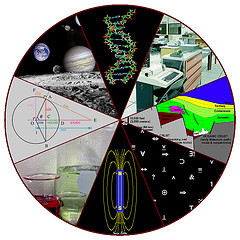Science in the ‘National Interest’: What About Everything Else? [UPDATE]
 The Republican-led House Committee on Science, Space and Technology, chaired by Rep. Lamar Smith (TX-21), wants the National Science Foundation’s grants to be evaluated based on the “national interest.”
The Republican-led House Committee on Science, Space and Technology, chaired by Rep. Lamar Smith (TX-21), wants the National Science Foundation’s grants to be evaluated based on the “national interest.”
Bring it, boneheads. By all means let’s try that standard against EVERYTHING on which we spend federal money.
How many television and radio stations, licensing publicly-owned airwaves, are granted licenses under which they are supposed to serve the “public interest, convenience, or necessity”? Because apart from emergency broadcast signal testing, most of them don’t actually do that any longer, suggesting we really need to re-evaluate broadcasters’ licenses. Let’s put the FCC’s licensing under the microscope. If broadcasters aren’t truly serving “national interest” in the manner parallel to a House Science Committee discussion draft — proposed criteria being “economic competitiveness, health and welfare, scientific literacy, partnerships between academia and industry, promotion of scientific progress and national defence” — the least they could do is pay us adequately for a license to abuse our publicly-owned assets as well as our sensibilities. There’s probably something in the defunct Fairness Doctrine about broadcasting and the nation’s interests…unless, of course, “public” does not mean “nation.” Perhaps Rep. Smith believes “national interest” = “business interest,” which opens up a massive can of definition worms.
How about banks and insurance companies? How many of them were in one way or another not merely affected by the financial meltdown of 2008, but direct contributors to the cataclysm because their standards of operation were shoddy — specifically, with regard to subprime mortgages. Why not put their regulation under the same lens: are these financial institutions serving the “nation’s interest”? The financial industry’s business practices and the regulatory framework existing in early 2008 certainly didn’t defend this nation’s economic competitiveness, damaging the ability to obtain credit as liquidity was threatened. Jeepers, wasn’t that the intent of defunct Glass-Steagall Act after the Great Depression, to assure that commercial and investment banking acted in a secure manner consistent with the nation’s interests?
We could go on and on across the breadth of departments and regulatory bodies which either issue funds or licenses, putting them all to the same test. Do they serve the “national interest”?
The problem here isn’t that the NSF in particular isn’t validating grants as to whether they serve the “national interest.” The NSF already uses criteria to evaluate proposal submissions for their alignment with the nation’s aims. Read more →
